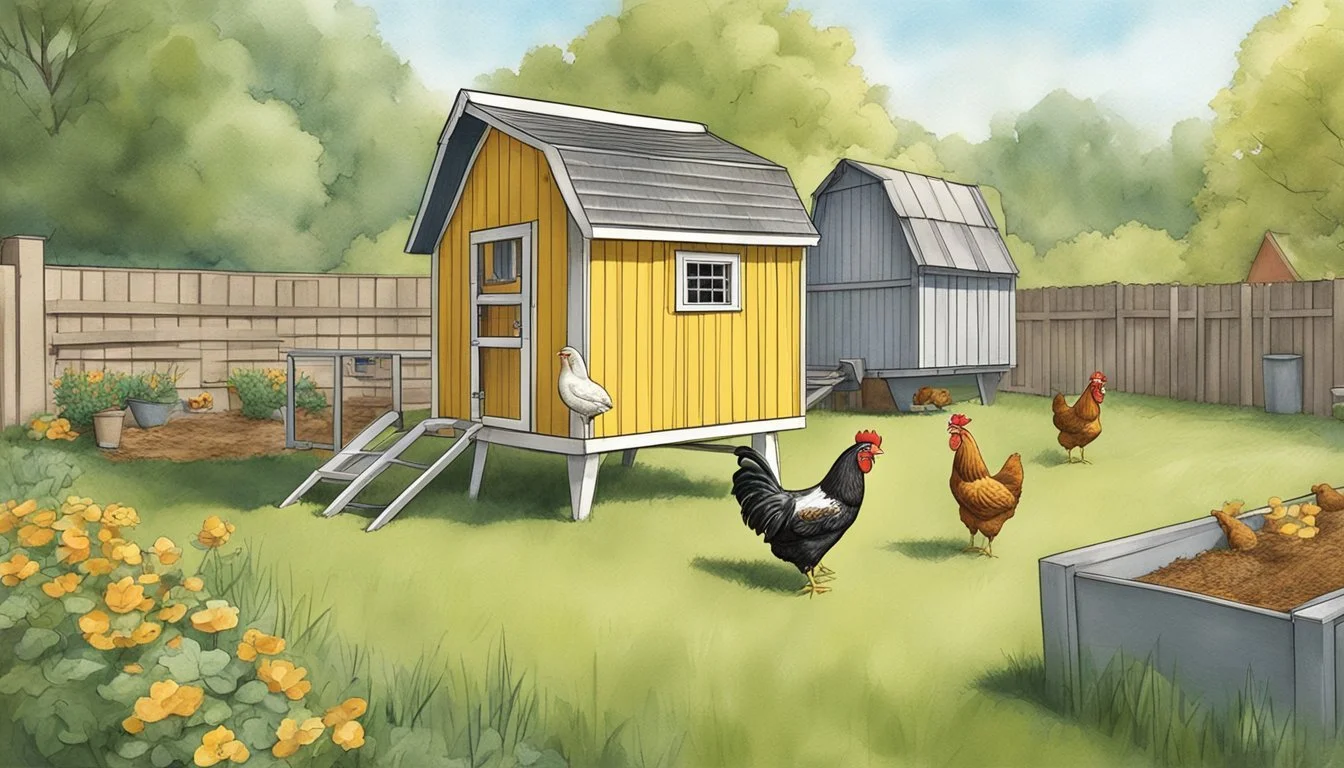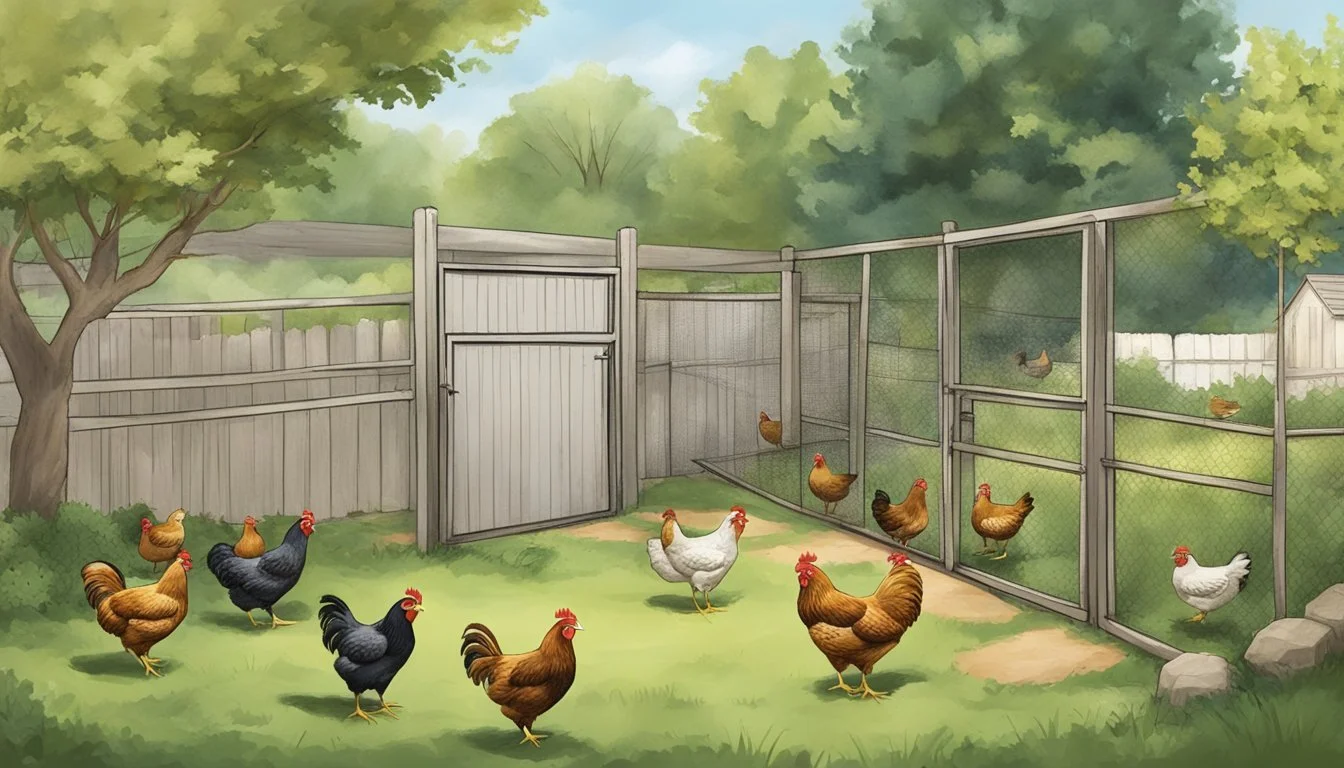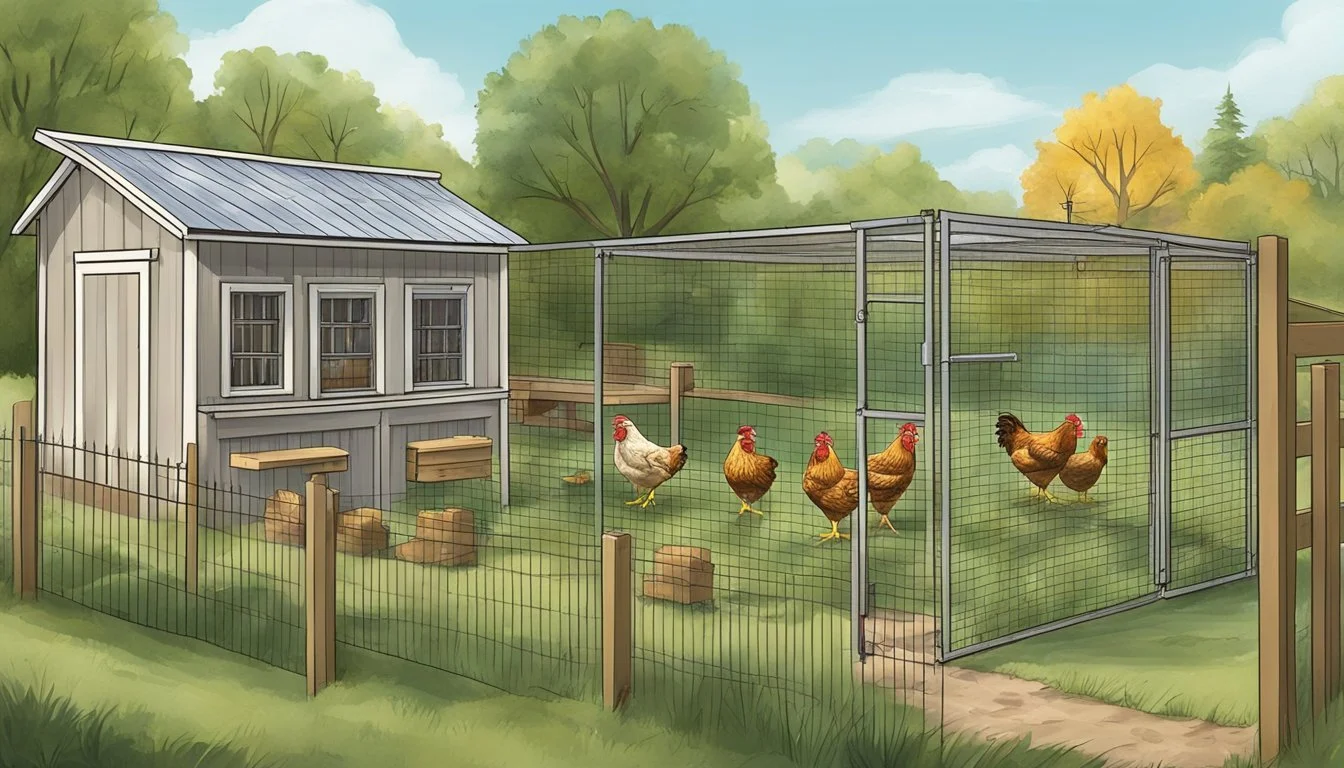Keeping Backyard Chickens in Kansas City, MO
Urban Poultry Essentials
Raising backyard chickens has become a popular practice in urban areas, offering residents the chance to enjoy fresh eggs and the benefits of a closer connection to their food sources. In Kansas City, Missouri, the regulations regarding the keeping of chickens are designed to balance this growing interest with considerations for public health, animal welfare, and neighborhood dynamics.
Residents of Kansas City are allowed to keep chickens under certain conditions. The city permits up to 15 chickens for those aged 4 months or older, or up to 50 chicks that are younger than 4 months. The practice is becoming increasingly mainstream as individuals look for sustainable and environmentally friendly ways to live. However, it is imperative that prospective and current chicken owners understand and comply with the specific legal framework set by local ordinances to ensure a harmonious coexistence with their neighbors and community.
Special permits may be required for individuals who are unable to meet specific criteria, such as the distance requirements from neighboring properties. These rules are in place not only to manage potential nuisances like noise and odors, but also to ensure the health of the chickens and that of the community at large. Familiarity with and adherence to the local laws is essential for anyone considering or currently keeping chickens in Kansas City.
Understanding Local Chicken Ordinances in Kansas City, MO
Local chicken ordinances in Kansas City, Missouri, provide clear guidelines on keeping backyard chickens, which are essential for residents to comply with the city's standards.
Overview of Missouri Chicken Ordinances
Missouri's municipalities have their own specific rules regarding the keeping of backyard chickens. These rules typically govern the number of chickens allowed, coop placement, and care standards to ensure animal welfare and neighborhood harmony. It's important for residents to refer to their local ordinances for the most accurate and applicable regulations.
Kansas City Specific Regulations
In Kansas City, Missouri, residents are allowed to keep chickens under the following stipulations:
A maximum of 15 chickens is permitted if they are 4 months or older.
For chicks under 4 months old, residents may keep up to 50 chicks.
Chicken coops must be at least 25 feet from any neighboring dwelling's door or window.
Coop placement must also adhere to a guideline of being at least 5 feet from a side yard lot line and 18 inches from a rear yard lot line.
Furthermore, chickens must have continuous access to food, water, and shelter that sufficiently protects them from the elements. The conditions in which the chickens are kept must adhere to sanitation standards, preventing offensive odors and the presence of flies.
Application Process for Keeping Chickens
To keep chickens legally in Kansas City, residents must acquire a permit. The process involves:
Contacting the local animal control or visiting the city's official website for the permit application.
Completing the necessary forms, which may require detailed information on the proposed chicken-keeping setup.
Payment of a fee as prescribed by the city's ordinance.
Upon successful processing, the permit will be issued. Permits typically require periodic renewal, and compliance with all regulations is mandatory throughout the permit period. Failure to obtain or renew a permit or comply with local chicken ordinances can result in penalties.
Selecting the Proper Coop and Placement
When setting up a backyard chicken habitat, ensuring the chicken coop meets essential features and adhering to placement regulations are critical for compliance and the wellbeing of the chickens.
Essential Features of a Chicken Coop
A proper chicken coop should provide shelter, security, ventilation, and space for roosting and nesting. It must be built to withstand local weather conditions, including adequate insulation against cold winters and ample shade during hot summers. The coop should include:
Roosting Bars: Chickens prefer to sleep off the ground; provide 8-10 inches of roosting space per bird.
Nesting Boxes: Aim for a minimum of one box for every three hens, filled with soft bedding material.
Ventilation: Proper airflow is crucial to remove dampness and ammonia, so incorporate vents or windows that can be opened or closed as needed.
Protection: Include secure latches and hardware cloth instead of chicken wire to protect against predators.
Coop Placement Rules and Setbacks
Chicken coop placement within Kansas City, Missouri, must comply with local regulations. Coops must be situated at least 25 feet away from the doors or windows of neighboring residences to adhere to city guidelines.
Front Lot Line: Coops should be behind the front lot line of one's property, maintaining the residential aesthetic of the neighborhood.
Side and Rear Lot Lines: Position the coop at least 25 feet away from side and rear lot lines to ensure adequate space from neighbors.
Permit Consideration: Residents may need to obtain a permit, so checking with local ordinances before placement is recommended.
Number of Chickens and Restrictions
Managing backyard chickens in Kansas City, MO, involves adhering to certain restrictions, with specific emphasis on the number of chickens allowed, rooster regulations, and consideration for neighbors.
Limits on Chickens Allowed
Kansas City, Missouri permits residents to keep up to 15 chickens that are 4 months or older. For chicks under 4 months of age, the limit is increased to a maximum of 50. These regulations ensure that chicken keepers can maintain a reasonable flock size without overwhelming urban spaces.
Rooster Regulations
When it comes to roosters, the city has a clear stance: no roosters are allowed if they can be heard crowing within 300 feet of any other residence or building besides the owner's. This rule is in place to mitigate noise complaints and maintain a peaceful environment within residential areas.
Neighbor Considerations
Chickens must be kept in a way that respects the proximity of neighbors. Coops are required to be no closer than 100 feet to any neighboring buildings that are occupied or used by humans, excluding the owner's dwelling. This ensures health and sanitation standards are maintained, and minimizes any potential nuisances such as odor or noise, fostering neighborly relations.
The adherence to these guidelines will promote responsible chicken keeping in the urban setting of Kansas City, MO.
Health, Safety, and Neighborly Etiquette
Keeping backyard chickens in Kansas City, MO, requires consideration of health and safety standards, as well as maintaining good relationships with neighbors. Understanding the management of chicken manure, effective communication with neighbors, and the role of animal control are essential for a harmonious and compliant chicken-keeping experience.
Managing Chicken Manure
Chicken manure is an excellent fertilizer but must be handled properly to avoid health risks. Kansas City, MO, residents should:
Compost manure before use to kill pathogens.
Store manure in a sealed container away from living areas to reduce odor and flies.
Preventing and Resolving Disputes with Neighbors
Disputes with neighbors often arise from noise, smell, or property encroachment. Residents can:
Engage neighbors early to discuss plans for keeping chickens.
Maintain cleanliness and noise control to minimize disturbances.
Adhere to the city's requirement to keep chickens 100 feet away from the nearest residence.
Role of Animal Control
Animal control plays a crucial role in enforcing regulations and ensuring public health. They:
Provide permits and informative resources for prospective chicken owners.
Enforce local laws, such as the limit of 15 backyard chickens and the proper distance requirements for coops.
Are the first point of contact for neighbors with complaints or concerns about backyard chickens.
Daily Care and Maintenance of Backyard Chickens
Maintaining backyard chickens in Kansas City, MO, requires consistent care. Owners should ensure that chickens have access to fresh water and proper feed daily. Water containers must be cleaned regularly to prevent algae and bacteria growth, which can harm the birds.
Chickens also require a balanced diet consisting of commercial chicken feed, which can be supplemented with grains and occasional treats such as fruits and vegetables. It is crucial to avoid overfeeding, as obesity can lead to health issues.
Feeding Schedule:
Morning: Provide fresh feed; remove leftover wet or moldy feed.
Evening: Check feed levels; top up if necessary.
Regarding housing, the coop should be checked daily for cleanliness and security:
Remove droppings and refresh bedding as needed.
Ensure coop doors and fencing are secure to protect chickens from predators.
Egg collection should occur at least once a day to ensure freshness and prevent eggs from becoming dirty or damaged.
Egg Collection:
Collect eggs in the morning to reduce the chance of breakage.
Store eggs in a cool, dry place if not used immediately.
Lastly, chickens need to spend time outside the coop, foraging and exercising. A secure backyard is pivotal for their well-being, as it reduces stress and prevents unhealthy weight gain.
Outdoor Time:
Supervise free-range periods to protect from predators.
Provide areas for dust baths, crucial for feather maintenance and parasite control.
Adhering to these daily care practices helps backyard chickens in Kansas City, MO, stay healthy and productive.
Understanding the Impact on Local Ecosystems
Keeping backyard chickens in Kansas City, Missouri, has implications for local ecosystems that are important to understand. Backyard chickens, when managed properly, can contribute to the ecological health of an area, but they also present challenges that need careful consideration.
Firstly, chickens contribute to natural pest control by eating insects, which can reduce the need for chemical pest management. This can lead to a healthier environment, as heavy use of pesticides is known to harm beneficial insects and wildlife.
Next, the production of eggs from backyard chickens can decrease reliance on store-bought eggs, which often come from distant farms. This reduction in transportation can lead to a decrease in carbon footprint associated with food miles.
Chicken manure is rich in nitrogen and can be an excellent fertilizer when composted properly. It promotes plant growth and soil health, potentially reducing the need for artificial fertilizers in the state or county. However, it is crucial to manage waste correctly to prevent nutrient runoff, which can harm local waterways.
Despite these benefits, if the backyard chicken trend proliferates without proper regulation, it can lead to over-concentration of nutrients in the soil, issues of odor, and potential attraction of pests. Consequently, the state and county have established guidelines to ensure backyard chickens are kept in a way that respects neighbors and the environment.
Maximum Number of Chickens: Set to avoid overburdening local ecosystems.
Distance Regulations: Ensures chickens are kept a certain distance from homes to mitigate noise and smell.
Age of Chickens: Special allowances for chicks to support the natural life cycle of backyard flocks.
Adhering to these guidelines ensures that the environmental impact of keeping backyard chickens in Kansas City remains minimal and beneficial.
Exploring Chicken-Friendly Neighborhoods and Nearby Cities
In the Kansas City area, ordinances vary by city, affecting where and how residents can keep backyard chickens. Below is a detailed look at the specific policies in Mission, Overland Park, Independence, and Lee’s Summit.
Mission and Overland Park Policies
Mission, Kansas, maintains distinct rules for residents wishing to keep chickens. Properties must be of adequate size and distance from neighbors to ensure compliance:
Minimum Lot Size: Not specified, check local codes.
Distance Requirements: Chickens must be kept a certain distance from neighboring dwellings.
Permit Required: Yes, residents must acquire a permit.
Chickens Allowed: Typically limited in number; roosters often prohibited.
Overland Park, meanwhile, displays a progressive stance towards urban chicken farming:
Minimum Lot Size: Overland Park allows chickens on lots greater than 0.20 acres.
Distance Requirements: Reduced from previous limits; specifics to be checked with current codes.
Permits: May be required; check current city ordinances.
Chickens Allowed: Only hens are eligible to maintain noise control.
Chicken Keeping in Independence and Lee’s Summit
Independence, Missouri, offers the possibility for residents to partake in backyard chicken keeping under certain conditions:
Maximum Chickens Allowed: As per city regulations, a specific number will be outlined.
Permit Required: Yes, similar to other cities, a permit is likely necessary.
Zoning Restrictions: Residential areas may have unique rules, important to review local ordinance.
Lee’s Summit has its regulations that residents must follow to keep chickens within city limits:
Permit Required: Residents must apply for a permit to legally keep chickens.
Housing Requirements: Coops must meet specific construction and maintenance standards.
Number and Type of Chickens: The city may restrict the number of chickens and the inclusion of roosters.
People interested in keeping chickens must ensure their properties comply with local ordinances before starting their chicken coops. Checking with city officials and zoning boards is crucial as regulations can be subject to change.








